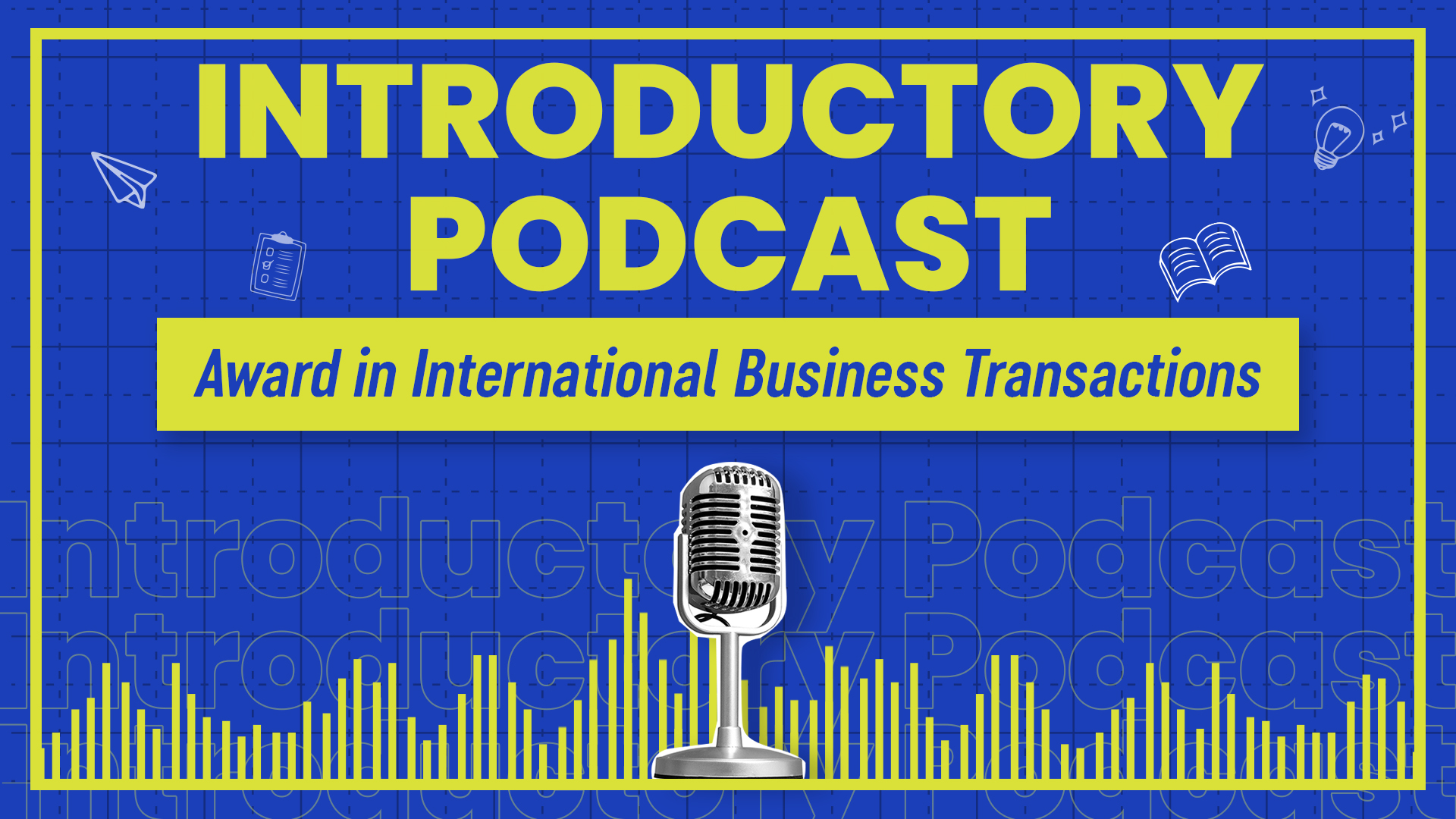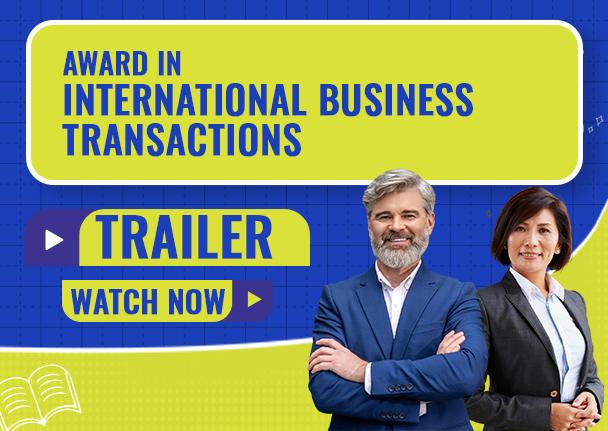Award in International Business Transactions
The International Business Transactions module provides students with a comprehensive understanding of the legal and commercial aspects of conducting business across borders.
-
OrientationDirector’s Introduction03:27Orientation10:52Understanding Podcasts01:46Understanding Pre-recorded Lectures02:25Understanding Pre-recorded Interviews01:54Understanding Case Studies01:47Understanding Discussion Boards02:30Ascencia Style SheetAI PolicyPolicy for Online Interaction and Behaviour for E-Academic Students
-
Coursework: International Business TransactionsIntroductory Podcast00:05:34Assignment Podcast05:22
-
Lecture 1: Key Principles of International Business TransactionsLecture 1: Part 1(A): Key Principles of International Business Transactions01:17:10Lecture 1: Part 1(B): Key Principles of International Business Transactions01:08:38Lecture 1: Part 2: Key Principles of International Business Transactions00:37:57Article: The ASEAN Free Trade AreaArticle: Directive (EU) 2019/770 of the European Parliament and of the Council of 20 May 2019 on Certain Aspects Concerning Contracts for the Supply of Digital Content and Digital Services
-
Lecture 2: International Sales Contracts - Understanding the CISG and BeyondLecture 2: Part 1: International Sales Contracts - Understanding the CISG and Beyond01:01:36Lecture 2: Part 2: International Sales Contracts - Understanding the CISG and Beyond01:09:09Lecture 2.1: Part 1: International Trade Platforms (Eg. Amazon, eBay)01:02:31Lecture 2.1: Part 2: International Trade Platforms (Eg. Amazon, eBay)00:29:36Lecture 2.1: Part 3: International Trade Platforms (Eg. Amazon, eBay)00:51:26Article: Comprehensive and Progressive Agreement for Trans-Pacific PartnershipArticle: Directive (EU) 2019/771 of the European Parliament and of the Council of 20 May 2019 on Certain Aspects Concerning Contracts for the Sale of Goods, Amending Regulation (EU) 2017/2394 and Directive 2009/22/EC, and Repealing Directive 1999/44/EC
-
Lecture 3: IncotermsLecture 3: Part 1: Incoterms00:21:09Lecture 3: Part 2 (a): Incoterms01:16:31Lecture 3: Part 2 (b): Incoterms01:22:56Lecture 3: Part 3: Incoterms01:12:59
-
Lecture 4: The Pillars of Global TradeLecture 4: Part 1: The Pillars of Global Trade00:55:43Lecture 4: Part 2: The Pillars of Global Trade01:11:11Lecture 4: Part 3: The Pillars of Global Trade00:50:37Guest Interview : Kari Pisani50:38Document: United Nations Convention on Contracts for the International Sale of GoodsArticle: WTO - Principles of the Trading System
-
Lecture 5: Non-Establishment Forms of International BusinessLecture 5: Part 1: Non-Establishment Forms of International Business01:18:49Lecture 5: Part 2(A): Non-Establishment Forms of International Business01:22:59Lecture 5: Part 2(B): Non-Establishment Forms of International Business01:21:12
-
Lecture 6: Dispute Resolution in International Business TransactionsLecture 6: Part 1: Dispute Resolution in International Business Transactions01:12:28Lecture 6: Part 2: Dispute Resolution in International Business Transactions01:18:45Lecture 6: Part 3: Dispute Resolution in International Business Transactions01:10:06Case Study Set 1: International Sales Contracts and Dispute Resolution Case Studies 1Case Study Set 2: International Sales Contracts and Dispute Resolution Case Studies 2
-
Section 7: Electronic Data Interchange Systems
-
Quizzes
-
General ResourcesArticle: North American Free Trade AgreementArticle: WTO Legal TextsArticle: Rethinking Commercial LawArticle: The Double Life of International LawArticle: OECD Economic Outlook, Interim Report, March 2025Article: The OECD’S Contribution to Promoting Open Markets and a Rules- Based International Trading System in Good Working Order
The International Business Transactions module provides students with a comprehensive understanding of the legal and commercial aspects of conducting business across borders. The course will examine the legal, commercial, and cultural considerations involved in conducting business across borders, and the strategies and techniques used by global companies to minimize risks and maximise success. Students will have opportunities to apply theoretical concepts to real-world case studies and simulated business transactions, and to develop critical thinking skills in analysing global business issues.
Programme Outcomes
Upon completion of the module, students will be equipped with the knowledge and skills required to participate effectively in international business transactions, and to manage the legal, commercial and cultural challenges involved in conducting business across borders.
- MQF/EQF Level 6 qualification. However, students’ circumstances and experiences may also be considered during the application process—five years of relevant working experience in the industry of specialization.
- Proof of B2 level of English should be provided by the students upon application – IELTS level/grade 6 or the student’s country equivalent.
- A Bachelor’s degree or graduate degree in humanities, sciences, human resources, organisational behaviour, business, administration, management, communication, journalism, psychology, arts or a related field.
- Minimum 180 ECTS at MQF/EQF Level 6 previously acquired at a Higher Education institution.
- Outstanding written and oral communication skills.
- A minimum of one year of work experience in a business environment will be considered as an asset.
Course Syllabus Podcast
Gain a Comprehensive Understanding of the Course Syllabus with Our Informative Podcast.
- Assignment 2500 words - 100%
- Eportfolio
- You can submit your assessment at any time during the course.
What’s included
-
Duration :Full Time - 3 Months
Part Time - 6 Months - Learning: 125 +Hours
- Certificate

